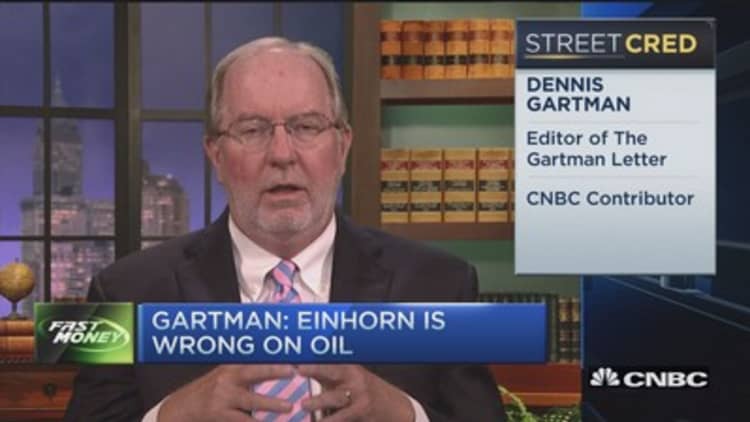
Fracking stocks fell hard for the second-straight day after hedge fund titan David Einhorn slammed the group for spending too much money and not making enough profits.
But according to Dennis Gartman of "The Gartman Letter," who is sometimes referred to as the "commodities king," one part of Einhorn's interpretation is "terribly, terribly wrong."
Einhorn's case centers around the ways that fracking companies spend, generate and return capital. According to Einhorn, the "large oil frackers have spent $80 billion more than they've received from selling oil" since 2006.
That discrepancy, said Einhorn, makes investing in oil frackers, specifically his main target, Pioneer Natural Resources, a bad bet. Worse still, he said, is the fact that even when oil was trading at $100 per barrel, about 40 percent higher than current levels, the companies still weren't making money.
"As oil prices rose, it seemed like the frackers should have been drowning in cash. But none of them generated excess cash flow. Not even when oil was at $100 a barrel. In fact the opposite was true," he said.
According to Einhorn, the companies responded to higher oil prices by spending more, thus burning even more cash.
Einhorn went on to say that oil prices are expected to recover, and he based his thesis on a chart of the futures curve.
Source: David Einhorn
However, while Gartman conceded that Einhorn could ultimately be correct about the frackers, he takes umbrage with his interpretation of the futures curve and what it could mean for oil prices, calling it flat out "wrong."
"David Einhorn misunderstood it completely," Gartman said on CNBC's "Fast Money" on Tuesday. "I hope that's not the predication for his position on the frackers. If it is, he's got it wrong."
Instead of indicating higher prices in the future, Gartman says Einhorn's chart actually signals lesser demand, greater supply, or both—all bearish indicators for the price of crude. According to Gartman, what the current futures curve really indicates is that oil traders are willing to pay more to store excess oil, which won't necessarily lead to higher oil prices.
Gartman said Einhorn's error is a common one and that "most people don't understand how the futures function." So who else is in that camp? Former Fed Chairman Ben Bernanke, who, Gartman wrote in his daily newsletter, also doesn't know "diddly" about crude oil futures.
—By CNBC's Michael Newberg



